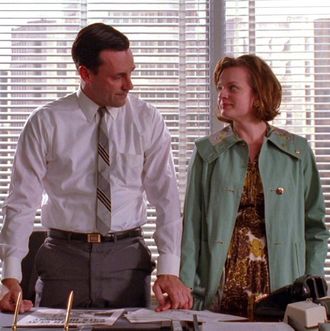
About halfway through “The Suitcase” — one of the most well-known and well-loved episodes of Mad Men — Peggy is near tears, upset with Don because she feels like he’s always overlooking her efforts and abilities. He never says ‘thank you,’ she points out, to which Don snappishly replies, “That’s what the money is for!”
As in most scenarios on that show, Don is mostly wrong, and Peggy is mostly right. Psychological research in recent years has, in fact, shown evidence for the motivational powers of a little appreciation at the office, writes journalist Janice Kaplan in her new book, The Gratitude Diaries, which was recently excerpted by The Wall Street Journal. In it, Kaplan cites a recent survey of 2,000 Americans about their thoughts on gratitude:
- 81 percent of respondents said that they’d be willing to work harder for an appreciative boss.
- 70 percent said they’d feel better about themselves and their efforts if their boss thanked them more regularly.
- And yet, gratitude at the office appears to be a pretty rare thing, with just 10 percent of survey respondents saying that they regularly showed their colleagues gratitude.
In most offices, it seems that the word thanks is mostly just a polite way to sign off your emails, and not much else. And that’s a problem, Kaplan explains, because the research shows gratitude can be a powerful motivator — surprisingly, even more so than financial incentives. In 2011, the London School of Economics published a review of more than 50 studies about workplace motivation, and found that people put more effort in at the office when they were intrinsically motivated — that is, if the work itself interested or excited them, and, importantly, if they felt appreciated by their colleagues.
On the other hand, financial incentives — while always welcome — can sometimes backfire when it comes to motivation, the LSE researchers found. “You need to start with a fair salary, but being given direct pay offs for performance can undermine the intrinsic and personal motivations that really make us want to give our all,” Kaplan writes. She also quotes Adam Grant, the Wharton professor who has studied prosocial behavior at work, on the subject, who expands on the idea. “A sense of appreciation is the single most sustainable motivator at work,” he said. “Extrinsic motivators can stop having much meaning — your raise in pay feels like your just due, your bonus gets spent, your new title doesn’t sound so important once you have it. But the sense that other people appreciate what you do sticks with you.”




